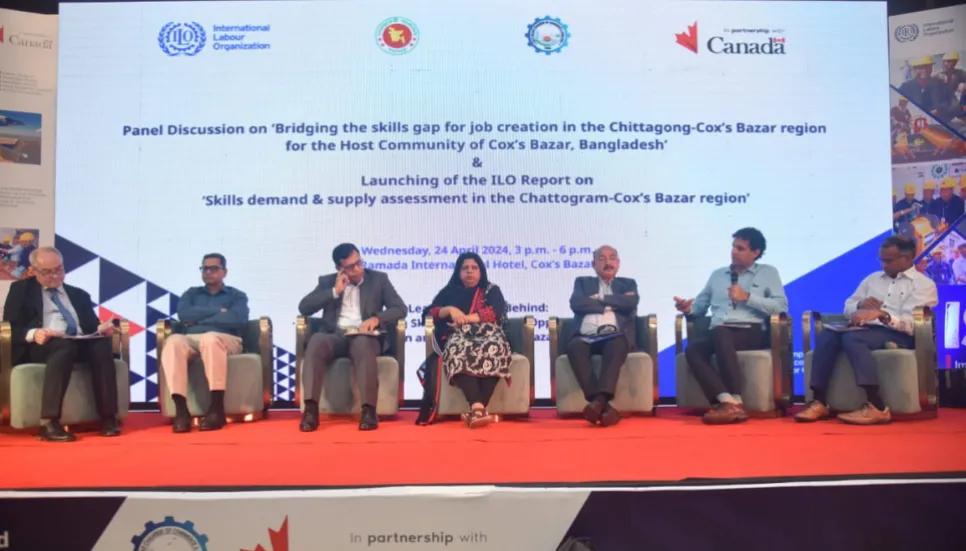
ILO Bangladesh and Cox's Bazar Chamber of Commerce and Industry released a report of 2024, titled “Skills demand and supply Assessment in the Chattogram-Cox's Bazar region,” identifying skills gaps impeding economic growth.
The shortage of qualified trainers, especially female trainers was identified as an important barrier to progress. Additionally, the absence of sector-specific data on employer’s skills needs hampers progress. Low enrolment of women in training programs highlights the urgent need to adopt measures for inclusiveness.
The findings were discussed with the objective of tackling the pressing issue of skill development and job creation in the high economic potential Chittagong-Cox's Bazar region.
The panel discussion was titled, “Bridging the Skills Gap for Job Creation in the Chittagong-Cox's Bazar Region for the Host Community of Bangladesh,” aimed to foster dialogue between a wide range of stakeholders to address the skills gap for jobs creation in the region.
The Chief Guest, Dr Gazi Md Saifuzzaman, director general (Grade I), Department of Youth Development (DYD), Ministry of Youth & Sports stated, “It gives me immense pleasure to know of the launch of ‘Skills Demand and Supply Assessment in Chattogram-Cox's Bazar region’ study conducted by ILO.
“I am certain that the outcomes of the study will guide the Government, Private Sector, UN organisations, NGOs, and Development Partners to design and deliver quality-assured harmonised market-driven skills development programmes for NEET youth and women aligned to the National Skills Development Framework – it is a commendable step towards bridging the skills gap for job creation in the Chittagong-Cox’s Bazar economic corridor.”
Vivek Prakash, counsellor and head of cooperation, Rohingya and Host Communities Program, Global Affairs Canada said, “Canada has been a development partner of Bangladesh since its independence and we were an early and sustained supporter for the Rohingya crisis as well, including a significant amount of support to the host communities.
“When I speak with young people in the Cox's Bazar region, they tell me they dream of building their skills for modern jobs such as graphic design. That's why we are proud to support ISEC and this comprehensive evaluation of required skills and accessible training.”
He added, “Using regional economic investments as our driving force, we can forge a path to inclusive employment, spanning soft skills to industry-specific expertise, so that we leave no one behind.”
United Nations Resident Coordinator for Bangladesh Gwyn Lewis said, “The private sector, Government, UN agencies and NGOs all have a role to play in training young people. Through this new report, forty-nine professions have been identified in the Chattogram Division and we need to work together to prepare young people for these professions.
“The inclusion of women and youth is a high priority and we particularly want to advance women in skills development and access to jobs.”
Country Director, ILO Bangladesh Tuomo Poutiainen said, “The Cox’s Bazar and Chattogram Economic Corridor has significant economic potential with its comparative advantages, government mega-projects, and increasing private investments in high-potential sectors.
“However, we must jointly build human and institutional capabilities, enhance investments and private sector connectivity, and promote partnerships for decent work opportunities. The skills anticipation study is a major step in the right direction. It has identified systemic and sector-specific skills needs, and 49 hard-to-fill occupations that have high growth and employment potential in the region.”
The project titled "Leaving No One Behind: Improving Skills and Economic Opportunities for Women and Youth in Cox's Bazar (ISEC project)" is funded by the Government of Canada.
The event took place on Wednesday at the Ramada Hotel in Cox's Bazar, and brought together experts and stakeholders from various sectors, whose collective expertise and insights contributed to the success of the discussions and paved the way for effective solutions to address the skills gap and promote inclusive economic growth.
President, Cox’s Bazar Chamber of Commerce & Industry Abu Murshed Chowdhury, Member (Joint Secretary), National Skills Development Authority (NSDA) Md Johar Ali, Director (Planning), Department of Youth Development (DYD) M A Akher, Director, Chittagong Chamber of Commerce & Industries Anjan Shekhar Das, Chief Executive Officer (CEO) of AK Khan & Co Ltd K A M Majedur Rahman, Chief People Officer of GPH Ispat Ltd Sharmin Sultan, Director of ICT & Tech Division, Ocean Paradise Hotel Abdul Quader Munshi, and other representatives from GoB, UN, partners, NGOs, private sectors, local workers union and related stakeholders were present.